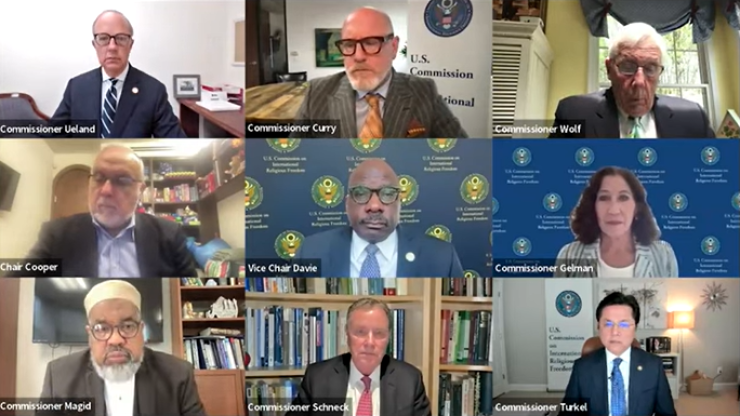
The United States Commission on International Religious Freedom (USCIRF) has raised serious concerns over worsening conditions for religious freedom in many countries around the world, as highlighted in its 2024 Annual Report released on 1 May 2024. The release of the report was broadcast live on USCIRF YouTube channel and had members of the commission present for the same.
The report, which documents developments during 2023, comes on the 25th anniversary of the enactment of the landmark International Religious Freedom Act (IRFA). This key legislation made promoting the right to freedom of religion or belief a priority in US foreign policy.
In a damning assessment, USCIRF Chair Abraham Cooper said the commission was "disheartened by the deteriorating conditions in many countries" detailed in the report. Despite a quarter century passing since IRFA's introduction, he stressed it is "more important now than ever" to ensure religious freedom remains a "key tenet" of America's global affairs.
The independent bi-partisan federal body has recommended that the US State Department designate 17 nations as "Countries of Particular Concern" (CPCs) for engaging in or tolerating severe violations of religious freedom. These include 12 countries already on the CPC list - Burma, China, Cuba, Eritrea, Iran, Nicaragua, North Korea, Pakistan, Russia, Saudi Arabia, Tajikistan and Turkmenistan.
However, USCIRF has called for a further five states to be added to this group due to their records - Afghanistan, Azerbaijan, India, Nigeria and Vietnam. While Vietnam was placed on the State Department's Special Watch List in December 2023, USCIRF believes violations there have reached the level requiring CPC designation.
For India specifically, USCIRF has called for it to be added to the CPC list, citing significant concerns including violence against religious minorities, laws restricting religious freedom, and policies hostile towards Muslims and Christians.
The commission recommends the US imposes targeted sanctions on individuals and entities responsible, incorporates religious freedom into bilateral and multilateral engagement like the Quad ministers' meetings, encourages monitoring by the US embassy, and urges Congress to condition financial aid and arms sales on improved conditions.
India is likely to reject the USCIRF's recommendations, mirroring its stance last year when the Ministry of External Affairs spokesperson Arindam Bagchi strongly rebutted the commission's 2023 report. Bagchi had accused USCIRF of "regurgitating biased and motivated comments about India" and rejected the "misrepresentation of facts" which he said only served to "discredit USCIRF itself." He urged the commission to "desist from such efforts and develop a better understanding of India, its plurality, its democratic ethos and its constitutional mechanisms."
Eleven other nations have been recommended for the Special Watch List itself, based on their perpetration or toleration of serious religious freedom abuses. Only Algeria is already included, with USCIRF pushing for Egypt, Indonesia, Iraq, Kazakhstan, Kyrgyzstan, Malaysia, Sri Lanka, Syria, Turkey and Uzbekistan to be added in 2024.
Kyrgyzstan's addition is a new recommendation in response to the government's "heightened religious repression" over the past year, according to USCIRF Vice Chair Frederick A. Davie. He said the US must enhance efforts to implement all of the watchdog's recommendations and consistently raise specific cases when engaging with oppressive regimes.
In a wide-ranging report, the commission also details key global trends like transnational repression by religious freedom violators, restrictive laws, attacks on religious sites, risks to minorities during elections, and rising antisemitism and anti-Muslim hatred. It further recommends re-designating seven non-state armed groups as "Entities of Particular Concern" for severe abuses.
While commending some positive US actions, including sanctions and prisoner advocacy, USCIRF's leadership insisted much more must be done 25 years on from IRFA's ground-breaking introduction. As the report stresses, the struggle to uphold this fundamental human right globally remains an urgent priority.




